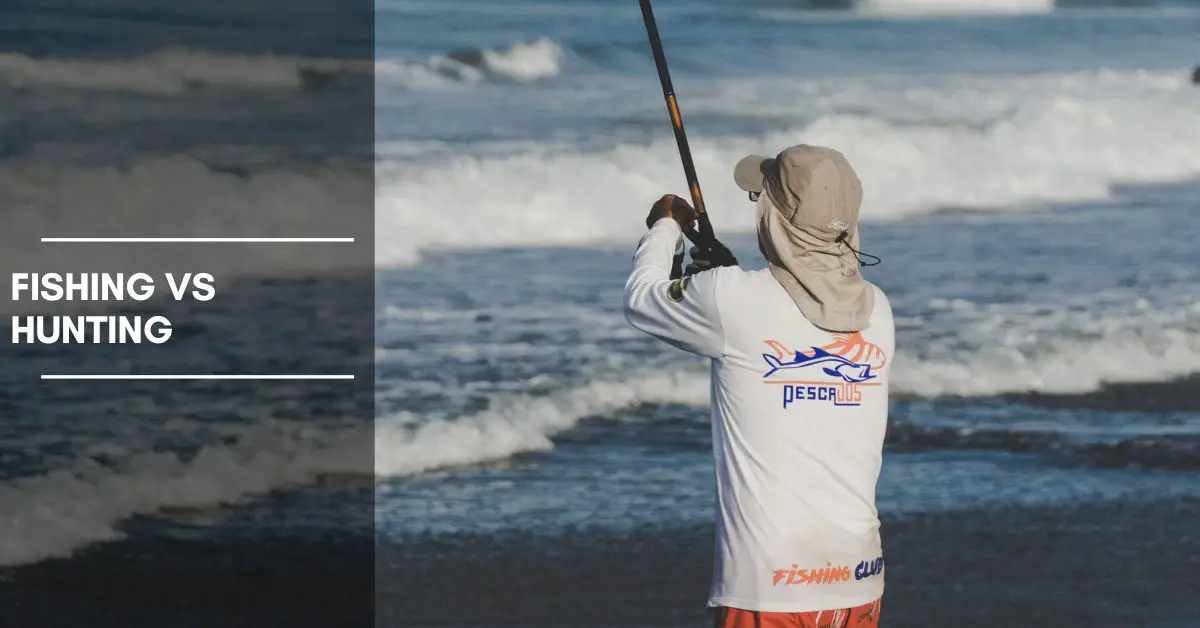Do you ever wonder if fishing counts as hunting? As an avid outdoors enthusiast, I’ve often found myself pondering the similarities and differences between the two activities.
In this article, we’ll explore whether fishing is a form of hunting, the differences and similarities between hunting and fishing, and what sets a hunter apart from a fisherman. So, let’s dive into the world of outdoor sports and unravel the mystery.
Is Fishing a Form of Hunting?
Well… yes and no 🙂
Fishing can be considered a form of hunting since both activities involve pursuing and capturing animals for food, sport, or population control. However, fishing primarily targets aquatic life, while hunting focuses on land animals. In addition, the techniques, tools, and regulations governing these two activities differ significantly.
The Core Differences Between Hunting and Fishing
1. Target Species
The most obvious difference between hunting and fishing lies in their respective target species. Hunting focuses on land animals such as deer, elk, rabbits, and birds. On the other hand, fishing is all about aquatic creatures like fish, crustaceans, and mollusks.
2. Techniques and Tools
Hunting and fishing employ different techniques and tools. Hunters use firearms, bows, and sometimes traps to capture their prey. Fishermen, on the other hand, use fishing rods, reels, nets, and other specialized gear designed for aquatic life.
3. Regulations and Licenses
Both activities are regulated by federal, state, and local laws, but the specific rules and licensing requirements vary. Hunting licenses and permits are usually species-specific and may have quotas or designated hunting seasons. Fishing licenses are often more general, allowing anglers to fish for multiple species within a specified time frame.
4. Ethical Considerations
While both activities involve the pursuit and capture of animals, the ethical considerations surrounding them can differ. Hunters are often held to a higher ethical standard due to the potential impact of their actions on land ecosystems and animal populations. Fishermen, too, must adhere to sustainable practices, but the concerns are more focused on overfishing and aquatic habitat conservation.
How Are Hunting and Fishing Similar?
Despite their differences, hunting, and fishing share some common traits. Let’s take a look at a few key similarities:
1. Outdoor Activities
Both hunting and fishing take place outdoors, immersing participants in nature and offering a respite from urban life. This shared connection to the environment fosters an appreciation for wildlife and the need for conservation efforts.
2. Skill Development
Hunting and fishing require the development of specific skills and knowledge, such as tracking, understanding animal behavior, and mastering the use of specialized equipment. Both pursuits reward patience, practice, and perseverance.
3. Cultural Significance
Hunting and fishing have deep cultural roots, playing essential roles in the traditions and livelihoods of various communities around the world. These activities have been integral to human survival and have shaped our relationship with nature throughout history.
What Sets a Hunter Apart from a Fisherman?
While hunters and fishermen share a love for the outdoors and an appreciation for the natural world, their interests and skill sets can differ significantly. Hunters typically focus on understanding land ecosystems, animal behavior, and mastering the use of firearms or archery equipment. In contrast, fishermen are more concerned with aquatic habitats, the habits of fish, and the art of casting and retrieving.
Conclusion
So, does fishing count as hunting? While both activities share some similarities, such as their connection to nature, skill development, and cultural significance, they differ in their target species, techniques, tools, and regulations.
Fishing can be considered a form of hunting, but it’s essential to recognize the unique aspects that set it apart from traditional hunting. In the end, whether you’re a hunter or a fisherman, the key lies in understanding and respecting the environment and the wildlife that calls it home.
Frequently Asked Questions
1. Can I go fishing and hunting with the same license?
No, fishing and hunting licenses are typically separate. You’ll need a specific license for each activity, as they are governed by different regulations and requirements.
2. Can fishing be considered a form of hunting if I use a spear or bow?
While using a spear or bow for fishing brings the two activities closer together, the primary distinction still lies in the target species and habitat. Thus, even with these methods, fishing remains distinct from traditional hunting.
3. What is the most significant factor that separates fishing from hunting?
The most significant factor separating fishing from hunting is the target species and their respective habitats. Fishing primarily targets aquatic life, while hunting focuses on land animals.
4. Do hunters and fishermen have different ethical responsibilities?
Both hunters and fishermen have ethical responsibilities, but the concerns may differ. Hunters are responsible for ensuring the sustainability of land ecosystems and animal populations, while fishermen must focus on preventing overfishing and conserving aquatic habitats.
5. Can hunting and fishing coexist in the same area?
Yes, hunting and fishing can coexist in the same area, as long as the activities are properly managed and regulated. In fact, many outdoor enthusiasts enjoy both pursuits and appreciate the diversity they offer in terms of skills, experiences, and connections to nature.

